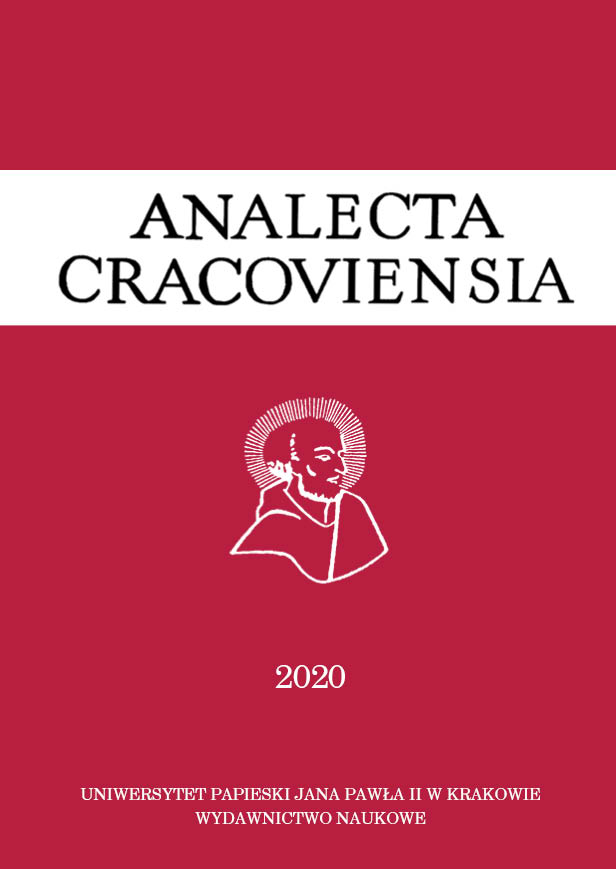The Anthropological Mercy in the Mystical Experience (Faustina Kowalska) and the Philosophical Reflection (Joseph Tischner). The Items of the Ontological (Theo-)Anthropology. Part II.
DOI:
https://doi.org/10.15633/acr.4050Keywords:
anthropological mercy, ethics, religion, metaphysics, being oneself, ontological (theo-)anthropologyAbstract
This article is the second part of a study in the scope of comparative analysis of the two concepts of anthropological mercy: the religious, in the mystical sense, concept of Faustina Kowalska (Diary) and the ethical-religious, in the reflective sense, concept of Joseph Tischner. This article concerns the anthropological mercy in the approach of Tischner. The general similarities between this two concepts in religious dimension allow us to consider them from the perspective of one problem: the interaction between ethics and religion. The problem is studied on the basis of ontological (theo-)anthropology (a person is studied from the perspective of the possibility and obligation of being self). The purpose of the analysis is a justification for the thesis that the interaction between ethics and religion is based on a metaphysical factor. This purpose is achieved by demonstrating that the ethical-religious anthropological mercy in the philosophical approach of Tischner has a metaphysical basis and essence – and that in these metaphysical terms one can define the phenomena of the religious anthropological mercy depicted in the Diary.
References
Bobko A., Wstęp. Józefa Tischnera myślenie o człowieku, w: J. Tischner, O człowieku. Wybór pism filozoficznych, oprac. A. Bobko, Wrocław–Warszawa–Kraków 2003.
Gadacz T., Bóg w filozofii Tischnera, „Znak” 2001 nr 550, s. 25–38.
Gadacz T., Filozofia Boga w XX wieku. Od Lavelle’a do Tischnera, Kraków 2007.
Karpiński P., Zrozumieć człowieka. Antropologia kazań Ks. Józefa Tischnera, Sandomierz 2012.
Kowalska F., Dzienniczek. Miłosierdzie Boże w duszy mojej, Warszawa 2005.
Szary S., Człowiek – podmiot dramatu. Antropologiczne aspekty filozofii dramatu Józefa Tischnera, Kęty 2005.
Tarnowski K., Bóg u Levinasa i Tischnera, w: Fenomenologia polska a chrześcijaństwo, red. J. Gomułka, Kraków 2014, s. 353–367.
Tischner J., Drogi i bezdroża miłosierdzia, Kraków 2015.
Tischner J., Etyka wartości i nadziei, w: Wobec wartości, D. von Hildebrand, J. Kłoczowski, J. Paściak, J. Tischner, Poznań 1984, s. 55–149.
Tischner J., Fenomenologia spotkania, „Analecta Cracoviensia” 10 (1978), s. 73–98.
Tischner J., Filozofia dramatu. Wprowadzenie, Paris 1990.
Tischner J., Idąc przez puste Błonia, Kraków 2005.
Tischner J., Ksiądz na manowcach, Kraków 2007.
Tischner J., Myślenie według wartości, Kraków 1982.
Tischner J., Myślenie w żywiole piękna, Kraków 2005.
Tischner J., Nadzieja czeka na słowo, Kraków 2011.
Tischner J., O myśleniu i doświadczeniu w Królestwie wiary, w: Horyzont dialogu i rozumienia. W kręgu myśli Józefa Tischnera, red. K. Pietrych, Łódź 2015, s. 19–28.
Tischner J., Polski młyn, Kraków 1991.
Tischner J., Spór o istnienie człowieka, Kraków 1998.
Tischner J., Sprawa osoby – wstępne przybliżenie, „Logos i Ethos” 1992 nr 2, s. 5–19.
Tischner J., Uprawiam filozofię dobra, w: Rozmowy o filozofii, red. A. Zieliński, M. Bagiński, J. Wojtysiak, Lublin 1996, s. 251–269.
Tischner J., Zrozumieć własną wiarę, Kraków 2006.
Tischner J., Zańko D., Gowin J., Przekonać Pana Boga, Kraków 2010.
Tischner J., Żakowski J., Tischner czyta „Katechizm”, Kraków 2009.
Wajsprych D., Pedagogia agatologiczna. Studium hermeneutyczno-krytyczne projektu etycznego Józefa Tischnera, Toruń–Olsztyn 2011.
Downloads
Published
Issue
Section
License
Authors who publish with this journal agree to the following terms:
- Authors retain the copyright and full publishing rights without restrictions, and grant the journal right of first publication with the work simultaneously licensed under a Creative Commons Attribution 4.0 International License that allows others to share the work with an acknowledgement of the work's authorship and initial publication in this journal.
- Authors are able to enter into separate, additional contractual arrangements for the non-exclusive distribution of the journal's published version of the work (e.g., post it to an institutional repository or publish it in a book), with an acknowledgement of its initial publication in this journal.
- Authors are permitted and encouraged to post their work online (e.g., in institutional repositories or on their website) prior to and during the submission process, as it can lead to productive exchanges, as well as earlier and greater citation of published work (See The Effect of Open Access).

